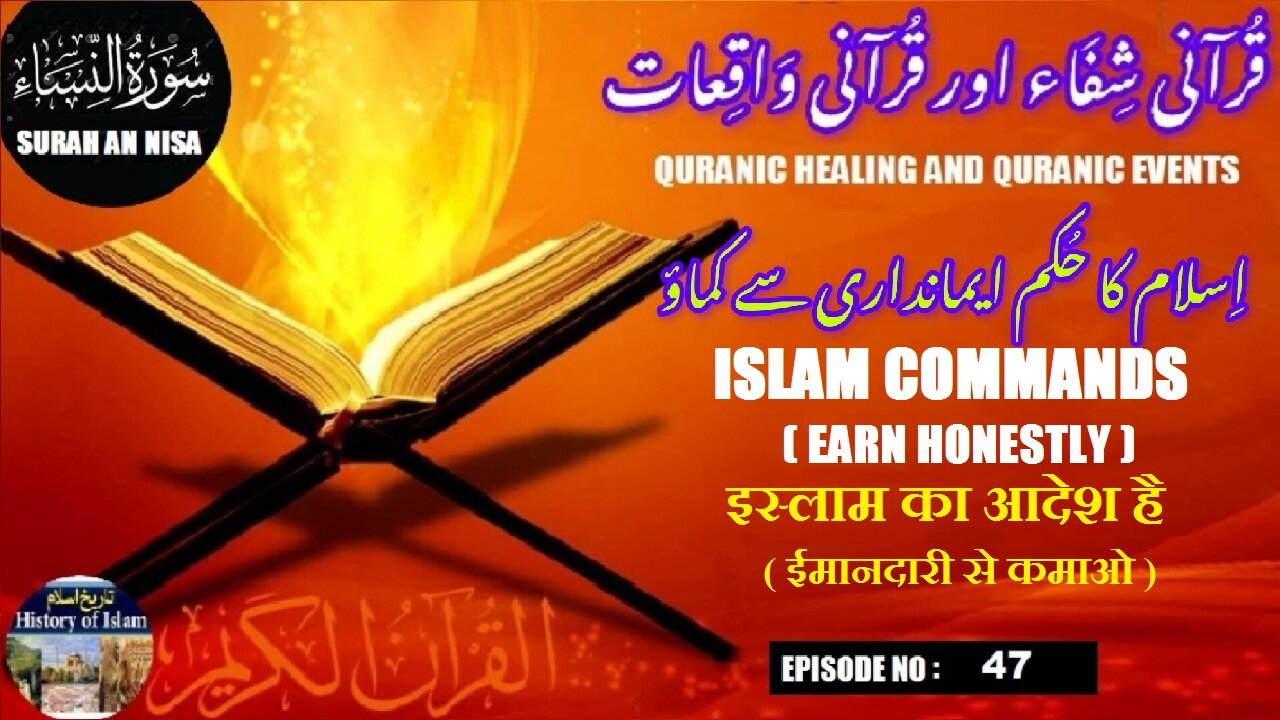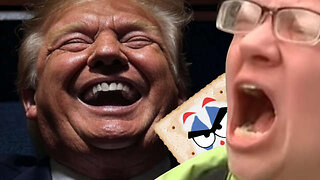Premium Only Content

Islam commands Earn honestly इस्लाम आदेश देता है ईमानदारी से कमाओاسلام کا حکم ہے. ایمانداری سے کماؤ
@islamichistory813 #islam #command #earn #honestly #trade #fairly #healing #and #events #from #the #quran #historical #stories #and #events #quranicstories #selfhealing #success #stories #striking #events #in #history #quranstories, #stories #from #the #quran #religious #creation #stories #trending #quran #short #historical #loves #historical #heroes #what #is #true #strength #calm #quran #recitation #for #babies #islamic #healing
Islam’s Command Earn Honestly, Trade Fairly.
Assalamu Alaikum, wa Rahmatullahi wa Barakatuhu.
Brothers, sisters, friends and elders, we are presenting the 47th episode of the Islamic informative video based on healing and events from the Holy Quran, and in this episode we will describe, Islam’s Command Earn Honestly, Trade Fairly.
Quranic Commands on Justice and Fair Dealing: A Reflection on Surah An-Nisa (4:29)
Justice and fair dealing are not only moral values in Islam but essential commandments that guide a believer’s conduct in every aspect of life, including financial transactions. One of the most powerful Quranic instructions in this regard is found in Surah An-Nisa, verse 29, which states: *“O you who believe! Do not consume one another’s wealth unjustly, except it be a trade by mutual consent. And do not kill yourselves. Surely, Allah is Most Merciful to you.”* This verse delivers a clear message that wealth and property must be handled with honesty, mutual agreement, and respect for others’ rights. Islam strongly prohibits the unjust acquisition of wealth—especially through fraud, deception, theft, bribery, or the misuse of legal tools like false oaths and manipulation. This command promotes both economic justice and moral integrity in a society.
The verse begins with a direct address: *“O you who believe!”* As is common in many Quranic injunctions, this opening signals that what follows is a matter directly connected to faith. This means that being honest and fair in financial dealings is not just a social good but a religious obligation. A person’s faith is not complete if they exploit others financially or engage in deceitful practices. The Quran recognizes the natural human desire to earn and accumulate wealth, but it insists that this must be done within ethical limits defined by justice and consent. Wealth must not become a source of oppression or corruption. Rather, it should be earned through hard work, lawful means, and fair agreements.
The central instruction of the verse is to *“not consume one another’s wealth unjustly.”* This broad command covers many forms of economic injustice. It includes outright theft, embezzlement, bribery, interest-based exploitation (riba), gambling, manipulation of weights and measures, hoarding, price fixing, and taking advantage of others’ ignorance or desperation. Any method that deprives someone of their rightful wealth through unfair or dishonest means falls under this prohibition. Islam recognizes the sanctity of personal property and commands believers to respect what belongs to others just as they want their own property respected. This rule ensures a just distribution of resources and protects the dignity and well-being of individuals in society.
However, the verse also provides a permissible route for wealth exchange: *“except it be a trade by mutual consent.”* This phrase is crucial because it defines the Islamic approach to business and financial interaction. Trade is allowed and even encouraged in Islam—as long as it is based on mutual understanding, transparency, and fairness. A transaction must be free from coercion, misinformation, or exploitation. Both parties must willingly agree, knowing what they are getting and giving. Mutual consent ensures that the exchange of wealth benefits all parties involved and that the transaction reflects honesty and justice. This concept also forms the basis of Islamic contract law, where terms must be clear and both sides must be treated fairly.
The next part of the verse adds another dimension to this command: *“And do not kill yourselves.”* While this may at first seem unrelated to the financial instruction, scholars interpret this phrase to refer both to physical harm and to broader social destruction caused by unjust economic practices. When people are cheated, denied their rightful earnings, or burdened with unjust debt, it leads to psychological stress, poverty, and sometimes even suicide. On a collective level, widespread fraud and corruption can erode trust, destroy social cohesion, and collapse economies. Thus, the Quran is warning that violating economic justice is not just a sin—it is a form of societal suicide. It leads to decay, chaos, and suffering. By upholding fair dealing, a society ensures its own survival, peace, and prosperity.
The verse ends with a powerful reminder: *“Surely, Allah is Most Merciful to you.”* This serves two purposes. First, it reassures believers that Allah has prescribed these rules out of mercy and care. He wants to protect people from harm, injustice, and ruin. The prohibitions are not meant to restrict freedom but to safeguard dignity and prevent the abuse of power. Second, it invites those who may have wronged others to repent and return to the path of fairness, knowing that Allah is forgiving to those who correct their behavior. Justice in Islam is always balanced with mercy, and the door to reform is always open.
In conclusion, Surah An-Nisa (4:29) provides a deeply ethical framework for financial interactions, grounded in justice, honesty, and mutual respect. It prohibits unjust enrichment, false dealings, and all forms of economic exploitation, while affirming the legitimacy of lawful trade and mutual agreement. This command is a cornerstone of Islamic economic teachings and reflects the Quran’s broader mission to establish a just, peaceful, and morally upright society. By obeying this verse, believers not only protect others' rights but also preserve their own spiritual integrity and contribute to the collective well-being of their communities. In a world increasingly plagued by financial corruption, this timeless guidance offers a path to fairness, trust, and divine blessing.
With this, we ask for your permission until tomorrow and pray to Allah Almighty to grant us the ability to act on the Quran and Hadith, Amen
Allah Hafiz
============================
-
 18:28
18:28
ISLAMIC HISTORY
1 day agoRabi-ul-Awwal Special Biography of Prophet Muhammad (PBUH) Part-3 سیرت نبوی صلی اللہ علیہ وسلم
1 -
 5:30:10
5:30:10
SpartakusLIVE
8 hours ago#1 Verdansk Sniper gets HACCUSATIONS because of INSANE Headshots
45.6K4 -
 46:18
46:18
SB Mowing
2 days agoShe was LOSING HOPE but this SURPRISE CHANGED EVERYTHING
28.7K40 -
 LIVE
LIVE
ItsLancOfficial
7 hours agoWE LIVE 🔴WE LIVE 🔴 SUNDAY SUNDAYS!!!!!!! TARKOV
510 watching -
 4:09:32
4:09:32
EricJohnPizzaArtist
6 days agoAwesome Sauce PIZZA ART LIVE Ep. #59: Are You Ready for some FOOTBALL with GameOn!
25.9K7 -
 1:21:43
1:21:43
Jake Shields' Fight Back Podcast
13 hours agoJake Shields and Paul Miller!
61.1K101 -
 1:20:41
1:20:41
TRAGIKxGHOST
4 hours agoTrying to get SCARED tonight! | Are You SCARED!? | Screams Beyond Midnight | Grab a Snack
20.5K2 -
 5:21:24
5:21:24
StuffCentral
6 hours agoI'm baaack (no you can't play with me.. unless you a healer)
22.4K4 -
 2:25:11
2:25:11
TheSaltyCracker
8 hours agoTrump Is Not Dead ReEEeStream 8-31-25
96.7K124 -
 3:09:16
3:09:16
THOUGHTCAST With Jeff D.
6 hours ago $4.49 earnedLabor Day Weekend FORTNITE With THOUGHTCAST Jeff & the squad
25.1K4